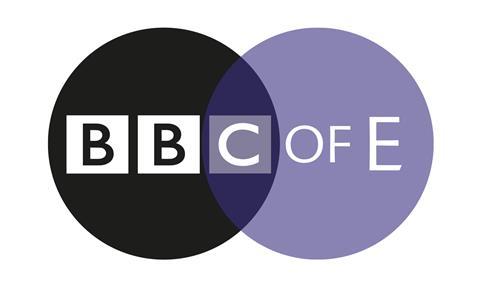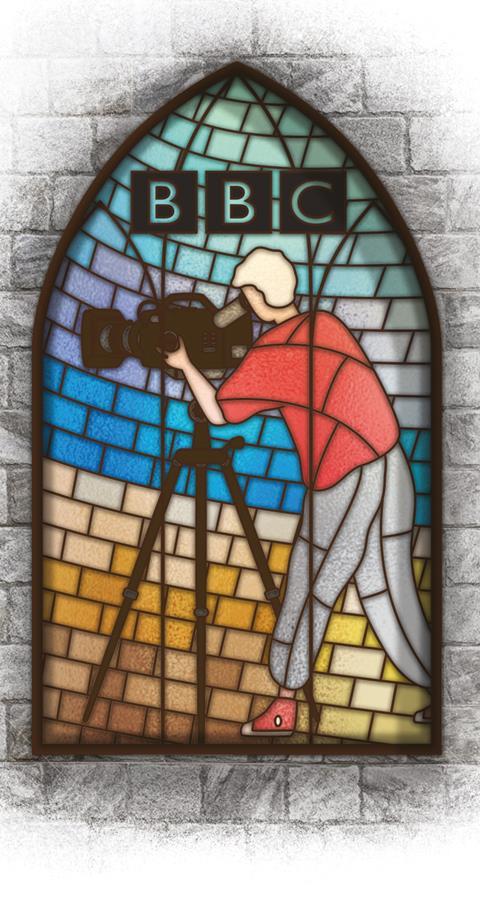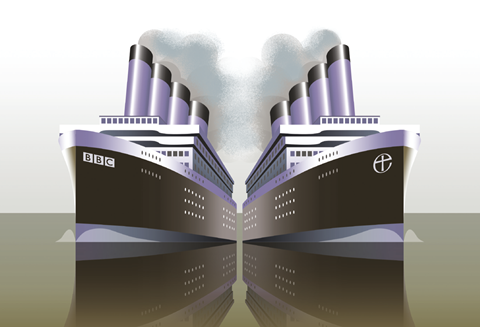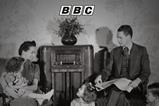
And now, a choice of viewing…One is a beloved institution unique to our shores, offering a local and national public service. The other has been described as a crumbling organisation in crisis: overgrown and overdue for reform.
But which is the BBC and which is the Church of England? They seem to switch places as often as the channel.
Or maybe, like me, you’re a faithful fan of both. Perhaps you recognise their faults but believe that, at their best, they help define our national identity (although I’m not suggesting for a moment that the Church of England defines your identity if you’re not from England). Is it just me or have Beeb-bashing and Church-chastising become national sports?
In the week I write this, The Daily Telegraph has published four pieces slamming the Church of England. The Spectator, The Times and Daily Mail have printed at least two each, while five Daily Express articles do the same with the BBC, plus two or more in The Spectator, The Times and Daily Mail. They may have fair criticisms – but is there nothing else to write about?
THE NATION’S FAVOURITE
From The Archers to cathedral choirs, Test Match Special to the Book of Common Prayer, Doctor Who to wedding ceremonies, Rodney Trotter to bell-ringing, these icons are enough to make a British expat or American Anglophile go misty-eyed and start humming ‘Jerusalem’. When I toured the States, my English accent unlocked an outpouring from countless locals. I recall a Pennsylvanian barista championing both Call the Midwife and Carols from Kings, waving the flag for both the Anglican Church and Auntie Beeb at the same time. They certainly seem to travel well.
We find it harder to appreciate them in this country, but then we’re closer to them. Their flaws are more visible, and the ways to fix them can seem obvious to us. Allegations of bias here, too much middle-management there…and who thought that was a good idea? They might aim for the best, but they often miss. Personally, I believe both national broadcaster and national Church can show us off at our global best, and deserve a bit of heralding now and then.
I REMEMBER A PREACHER ARGUING THAT THE VERY EXISTENCE OF STRICTLY COME DANCING WAS A SIGN OF THE END TIMES
This is not to do down the alternatives. Baptists, Methodists, ITV and Sky – I applaud you and many other churches and channels besides. In fact, great things happen when both the BBC and Church of England work with their competitors, from Churches Together to Amazon co-productions. BBC shows are filmed at ITV Studios and vice versa. They seem to get along.
It’s printed and social media who seem to have Auntie and Anglicanism in their sights, probably because taxes and licence fees mean we have more of a stake in them. The BBC and the Church of England seem to be the due north of their industries. Choose a different direction by all means, but the national conversation is magnetically drawn to these bigger beasts.
So, I’m interrupting with a special broadcast message: Let’s go a bit easier on two of our biggest and best cultural behemoths.
I should declare an interest: I’m an occasional employee of both; a freelancer who freely lances into churches and studios. I’m hardly at the heart of Broadcasting House or Lambeth Palace, though. I write sitcoms and do comedy shows for churches. More than anything I’m a lay person and licence fee payer. I look at my fellow congregants and audience, wishing each would stop throwing stones at each other. Because the stones have a habit of bouncing back at you.
MEDIA v CHURCH v MEDIA
I’m surprised at the frequency and ferocity of complaints lobbed from one to the other. I’ve been at church events where people have literally queued up to tell me exactly what they think of the BBC: how it’s a den of iniquity, out of touch and rife with cover-ups. I’ve been in TV production meetings where producers have grumbled similarly about the Church.
Many Christians seem sceptical of the BBC; I remember a preacher arguing that the very existence of Strictly Come Dancing was a sign of the end times. Equally many in the media are sceptical of the Church. Apart from Father Brown, if you see a priest in a crime drama, they’re probably dodgy.

Both the BBC and Church of England should certainly hold the other to account. Both organisations have allowed systemic problems to create grave mistakes. From the Butler-Sloss report to Operation Yewtree, we’ve seen the dangerous path of promoting star power without transparency. There’s certainly work to be done still. At their size, both BBC and Church of England are like ocean liners when it comes to changing direction or plotting new courses.
In my experience, though, the crew I’ve met onboard each are well-meaning, and many are among the nicest, noblest and hardest-working people I know. If Church and media could see that in each other, there may be greater understanding and communication between the two.
IN THE BEGINNING: WHEN AUNTIE MET THE FATHER
In my podcast The British Broadcasting Century, I’ve been charting British broadcasting’s origin story. Radio and religion were entangled from the very start. The BBC’s first boss, John Reith, was a son of the manse, his father a noted Scottish Presbyterian minister.
Two weeks before the British Broadcasting Company started, in October 1922, Reith moved to London in search of work. On arrival he went straight to church and heard the minister preach: “And I sought for a man among them…but I found none.” The preacher asked if anyone in the church that evening might be the one to save the country from heathendom and immorality. Reith saw this as his divine appointment. Twelve days later he applied to manage the new BBC, having no idea what broadcasting actually was.
Within weeks the first religious broadcast appeared: a Christmas sermon by Reverend John Mayo, who told listeners how humbled he was to preach to the biggest congregation in history, approximately 30,000 listeners.
Reith and other early BBC staff thought it their duty to protect the soul of the nation. There were no broadcasts on Sunday mornings, to encourage listeners to attend church. In job interviews, Reith often asked only one question: “Do you accept Jesus Christ as your Lord and Saviour?” Divorces and affairs were sackable offences.
Again the BBC was trying, but perhaps missing.
WHEN THE CHURCH OF ENGLAND AND THE BBC OVERLAP, THE VIEWING FIGURES CAN BE EXTRAORDINARY
In 1933, the BBC hired its first director of religion, the brilliantly named Reverend F Iremonger. Don’t be fooled by his fire-and-brimstone name, though. Iremonger brought religious broadcasting out of the ‘Sunday slot’, giving a voice to smaller denominations and religious groups, with weekday discussions and debates.
Away from religion, the BBC’s mission was to “inform, educate and entertain”, a noble aim with renewed focus in today’s pandemic. Just like the first broadcast church services in 1924 (St Martin-in-the-Fields held that first honour), BBC local radio has been playing a service each Sunday since the first lockdown. Radio 4’s Daily Service began in 1926 purely to bring church to those housebound. Sound familiar?
When the Church of England and the BBC overlap, the viewing figures can be extraordinary. In 1953 Westminster Abbey was seen by a global audience of a quarter of a billion for Queen Elizabeth II’s coronation. Three decades later, a billion people tuned in to watch her son marry Lady Diana Spencer at St Paul’s Cathedral. Too soon after, the funeral of the bride reached two billion viewers; Westminster Abbey again beamed across the world. Only Live Aid and the Olympics gained more global audience than these church services.
When cathedrals become TV studios, there’s an opportunity to reach the masses – just ask Bishop Michael Curry.
Remove the crown from the equation and we’re still left with strong, reliable religious programming. Songs of Praise turns 60 this year; it’s one of the longest-running British TV shows and one of the longest-running religious programmes anywhere in the world. The public service nature of the BBC makes that happen – so I doff my cap to Rev Iremonger.
PANDEMIC PHILANTHROPY
Public service has been vital during the pandemic. I was moved to tears watching Pastor Mick Fleming and his church’s food bank on, yes, BBC News. Meanwhile BBC local radio’s Make a Difference campaign has brought communities together, sourcing laptops for home-schoolers in need and arranging pharmacy collections for shielders.
Philanthropy on the BBC goes back to Christmas 1927, when a five-minute children’s charity appeal raised £1,342. Its descendants, Children in Need and Comic Relief have since raised more than £2bn between them.
For those doing down the BBC, I’d point them first to its current ‘Lockdown Learning’ initiative, which harks back to the first schools’ broadcasting of 1924. Education was one of the BBC’s biggest departments throughout the 1920s. Today, unlike commercial rivals, almost all of CBeebies’ output includes educational content: learning maths in Numberblocks, geography in Go Jetters and religious education in Treasure Champs.
Over in the churches, they facilitate the majority of toddler groups, with more than half of Anglican churches hosting one.
So when I see churchgoers tweet #DefundTheBBC, when I hear TV personalities argue for the Church’s decreased role in public life, I ponder how much worse off we’d be if we listened to them. Netflix and Dawkins will not provide.
The BBC and Church of England are like ocean liners when it comes to changing direction or plotting new courses

A LONELY PLACE
By their nature, both national Church and broadcaster are stuck in the middle, destined never to please all of the people all of the time. I was recently asked onto LBC’s Nick Ferrari’s show to talk about BBC bias, and he thought me mad to suggest the BBC was anything but rabidly left wing. He thinks it sides with Labour. Others complain it’s a mouthpiece for the Tories. If it’s upsetting both sides equally, maybe that’s balance?
The BBC’s impartiality was tested during the 1926 general strike. Newspapers stopped printing, so Chancellor Winston Churchill tried commandeering the British Broadcasting Company as a government mouthpiece. Reith refused, so Churchill began printing a state newspaper, the short-lived British Gazette. Blatantly one-sided, it closed after eight issues, while Reith personally announced the end of the strike in a rare appearance in front of the microphone. He’d won the public’s trust.
Both BBC and Church hold the government to account, whether bishops in the House of Lords or Nick Robinson on the Today programme. Sorry, Mr Churchill, but long may it continue.
The Church of England, meanwhile, is also on a tricky quest to please both conservatives and liberals. An Anglican threatening to leave the Church over its LGBT stance may feel it’s too pro- or too anti-. I don’t envy those steering the Church. The middle of the road can be a lonely place if more people are picking a side.
GOD’S HOUSE AND BROADCASTING HOUSE
Thanks to groups like Christians in Media, I’ve discovered more colleagues of faith as I move from show to show. I used to enter a TV production office feeling like Daniel approaching the lions’ den, but now I realise the lions are more like Aslan. Writers, actors, presenters, producers, directors, crew: Christians are everywhere, with access to some pretty powerful transmitters. They’re perfectly placed to do God’s work. Reith thought so. So let’s give them a chance.
Both the BBC and CofE are beloved institutions, but easy to knock. I have my problems with the Church of England, just as I don’t like everything on (or decisions made in) the BBC (seriously, give me a sitcom). I want them both to be their best. But I know I can’t pick my own schedule. Other people want to watch too.
We’re all broadcasters now. Since the first lockdown, a quarter of UK adults have watched or listened to a religious service, whether a local church’s YouTube channel or a BBC service. Perhaps this shift will help us appreciate the challenges and crossovers of Church and media, all seeking to transmit hope by informing, educating and maybe even entertaining.
So, criticise by all means. But wish their downfall? Not so much. Get involved and help them improve? Yes. The media’s religious illiteracy certainly needs work, just as faith groups could leave any judgement to the Lord.
I call for a metaphorical bridge, between the building with the cross and the one with the aerial on top.
To paraphrase a BBC group in their film about Christianity: when you think about it, apart from education, food banks, Monty Python, Evensong, The Proms, church fetes, Attenborough, architecture, Strictly, christenings, CBeebies, toddler groups, Wimbledon, Line of Duty, carol services, Match of the Day, weddings, funerals, Top of the Pops, women’s football, Detectorists, the liturgy, Kermode and Mayo, hospital chaplaincy, I’m Sorry I Haven’t A Clue, charity, Newsnight, the good news, telling great stories, telling the greatest story…what have the BBC and the Church of England ever done for us?




































